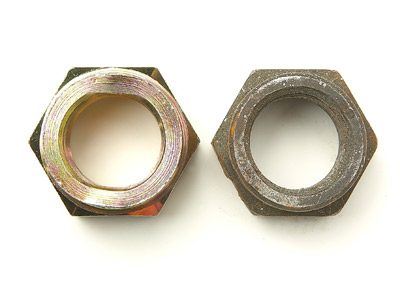A few extra bucks is easy insurance against a part failure later on.
Why Reusing Certain Automotive Fasteners is a No-Go
When diving into the world of auto repairs, it might be tempting to cut corners and reuse parts to save a few bucks. However, not every automotive component is designed for multiple uses, and this holds particularly true for specific fasteners known as “prevailing torque nuts.” Here’s why reusing them isn’t worth the risk.
On This Page
Understanding Prevailing Torque Nuts
Unlike your average automotive nuts and bolts, prevailing torque nuts are specialized. They are primarily used on significant components like axle shafts and ball joints – parts where a misplaced or loosened nut could lead to disastrous consequences, ranging from simple mishaps to tragic accidents.
During their manufacturing process, these nuts are intentionally deformed into an elliptical shape while hot. When tightened during installation, the force exerted by the bolt or axle shaft transforms the nut back into a round shape. Despite this transformation, the nut retains a degree of its original elliptical distortion. This design serves a critical purpose: to ensure the nut doesn’t loosen even in high heat conditions, where typical thread-locking compounds might fail.
Different Styles, Same Caution
There are two main types of non-reusable prevailing torque nuts: center locknut and toplock.
- Center Locknut: This version has its deformed portion situated in the middle, allowing it to be installed from either end.
- Toplock: This nut can only be placed one way. Its deformed end cannot engage with the threads, restricting its installation direction.
Regardless of the style your vehicle uses, the message remains the same: if you’ve taken one off, get a new one for reinstallation. Here’s why: a previously used nut won’t sustain the necessary torque when reused. The concept of manually “re-deforming” an old nut in a bench vise is futile – it simply isn’t designed for such manipulations.
The Price of Safety
Financially speaking, new axle nuts typically cost around $3, and ball joint nuts are even cheaper, often priced below $1. In the grand scheme of things, this small expenditure is a drop in the ocean, especially when considering the potential risk posed by reusing these fasteners. Safety, especially your family’s safety, is invaluable. When it comes to these specific automotive components, investing a few extra dollars can be the difference between a secure drive and a potential hazard. Remember, some savings just aren’t worth the risk.
— Rick Muscoplat, Automotive Editor
For more information on nuts and bolts, read our How to Loosen Nuts, Bolts and Screws on FamilyHandyman.com.




















